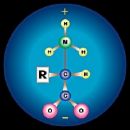What Are Amino Acids?Amino acids are chemical structures chained together to compose various types of proteins.
There are 21 different amino acids recognized in science to have some kind of useful function, ranging from providing energy for the body to protecting against cardiovascular disease.
Not one cell in the body could survive without the amino acids that proteins provide.
In fact, next to water, protein is the second most abundant substance in our bodies. How Do Amino Acids Work?When we eat protein rich foods, such as meat, dairy and legumes, our bodies break down the proteins into smaller components, allowing nutrients to be absorbed across the intestinal wall.
Specific proteins contain specific amino acids arranged in a specific order. Once these chains are broken down during digestion into the individual amino acids, the body can recombine them in different patterns to produce different
 proteins that the body needs for various other functions.
proteins that the body needs for various other functions.The body uses these new proteins and other individual amino acids not only to provide energy for the body, but also to maintain and repair muscles, bones, tissues and cells, as well as hair, skin and nails.
Amino acids are also essential for the production of neurotransmitters, body fluids, enzymes and many different hormones, such as insulin - the hormone that regulates our blood sugar levels.
The 21 different amino acids are broken down into two very important groups - essential and nonessential. Essential amino acids are those that you must obtain from your diet daily to keep your body in good supply. Nonessential amino acids are those that the body can produce on it's own without your help.
ESSENTIAL AMINO ACIDS
· Histidine, Isoleucine, Leucine, Lysine, Methionine, Phenylalanine, Threonine, Tryptophan, and Valine.
· Must be obtained from food daily!
· Found most commonly in these foods:
· Brown rice, wheat, lentils, nuts, seeds, soy, beef, fish, eggs, pork, poultry, dairy, potatoes, mushrooms, and avocadoes
NONESSENTIAL AMINO ACIDS
· Alanine, Arginine, Asparagines, Aspartic Acid, Cysteine, Glutamic Acid, Glutamine, Glycine, Proline, Serine, Taurine, and Tyrosine.
· Made daily by the body, so no need to worry!
Remember, all of these amino acids are used by the body on a daily basis, so it is important to include protein in your diet. Deficiency is most commonly caused by a low-protein diet, although it can also be brought on by medical conditions such as stress, infection or trauma, all of which force the body to use extra protein for recovery purposes.
Certain medication and chemical imbalances can also cause deficiencies. Symptoms of amino acid deficiency show up as fatigue, reduced metabolism, insomnia, hair-skin-and-nail problems, undue stress and poor health in general.
If you don't think you are getting enough protein in your everyday foods, think about taking an amino acid supplement, which can compensate for inadequate amino acid intake from food. Amino acid supplements can also be used for therapeutic purposes, such as for the prevention of heart disease. Dosages are different depending on which amino acid you're taking and for what reason, so just ask your doctor or local pharmacist about your needs.
Food Science





